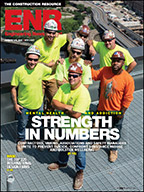Fiatech, an industry group made up of stakeholders who want to transform the world's infrastructure through technology innovation, has adopted a three-year strategic plan to ensure its research is well-targeted and valuable to members.
The plan follows a 16-month study by a strategic-direction member committee composed of 24 industry-leading owners, manufacturers, AEC firms and academic institutions from around the world. Retired Dow Chemical Co. executive Jerry Gipson led the endeavor.
Fiatech has been engaged in a systematic process of identifying issues and setting goals and strategies for implementing technology innovation since 2000.
"Our three-year strategic plan builds on our capital project technology roadmap to provide strategic direction to shape Fiatech's research and development activities for the next three to five years," says Gipson.
Ray Topping, Fiatech's director, says that, while the original road map has been updated a few times, this is the first time the organization has stepped back to take a long look at all its processes.
These include identifying and promoting industry-leading, technology-based solutions and innovative practices; developing and conveying compelling value propositions; and studying the application of its internal business model for operations and membership development.
Fiatech's vision has always been to create an organized, stakeholder-driven process to discover, field-test, assess and drive implementation of useful new ideas to improve the performance of its constituent organizations and their facilities.
In part, says Topping, Fiatech's strategic plan development is an exercise in applying that vision to itself.
The process began with an analysis of the organization's strengths, weaknesses, opportunities and threats. The analysis, included as an appendix to the plan and available online, draws a picture of the organization's style, particularly with regard to its strengths and weaknesses.
Under those categories, it notes that the members drive a process that is "agile, forward-thinking and a bit irreverent" and that Fiatech has a strong project-delivery system that puts the group at the forefront of industry problem-solvers.
But the process for selecting research projects across the road map's five topic areas—scenario-based project planning; automated design; integrated, automated procurement and supply; intelligent and automated construction sites; and intelligent, self-maintaining and -repairing operational facilities—has not been sharply defined and the method for measuring performance could stand improvement.
In the analysis, the threats include global economic competition as well as professional competition from new intermediaries entering the construction industry, such as Google, and the consequent "marginalizing of the AEC community."
Included among the threats—but also listed among the opportunities—is the challenge of helping the industry address the potential impacts of more legislation and regulation to protect critical-infrastructure data from cyber attacks.
The prime example cited is the cyber-security executive order signed by President Obama a year ago. It calls for the voluntary adoption of a framework to reduce cyber risks to critical infrastructure through the development of standards, methodologies, procedures and processes that align policy, business and technological approaches to address those risks.
Although industry compliance is "voluntary," insurance industry experts believe the cyber-security measures will gradually become de facto law through litigation, as legal rulings begin to establish those measures as the recognized standard of care.
Fiatech's plan notes that the consortium should play a role in helping the industry address the challenges raised by the executive order to secure infrastructure data in the U.S. and abroad, while also working to protect data interoperability and collaboration.
"The benefits of collaboration and transparent information sharing are so needed and so great within the industry, we have to have a method that both meets those needs as well as addresses the issues of cyber security," says Topping. "There is no solution or even a best-practice plan around [cyber security]. We will engage our network of relations and hold a strategic forum around cyber security to see what people are undertaking now and where more attention is needed."
The workshop on cyber security is one of several forums that soon will be scheduled as a next step to implementing the three-year plan.
"These will be full-day sessions with members and industry stakeholders to do deep dives into areas of current and pressing interest to our members," Topping says.



